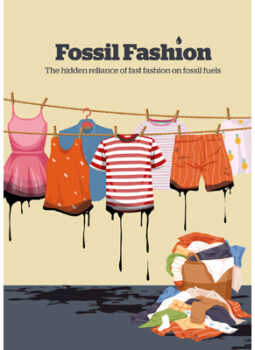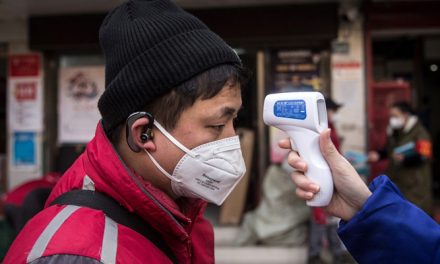 The global fashion industry has cultivated a dangerous addiction to synthetic fibres, made from climate-destroying fossil fuels like oil and gas, to power its fast fashion business model, according to a report released by a group of organisations that charts how the use of synthetic fibres, especially polyester, has doubled in textiles in the last 20 years. Use of synthetic fibres is likely to continue growing to reach nearly three quarters of total global fibre production in 2030, with polyester accounting for 85 per cent of this share, it says.
The global fashion industry has cultivated a dangerous addiction to synthetic fibres, made from climate-destroying fossil fuels like oil and gas, to power its fast fashion business model, according to a report released by a group of organisations that charts how the use of synthetic fibres, especially polyester, has doubled in textiles in the last 20 years. Use of synthetic fibres is likely to continue growing to reach nearly three quarters of total global fibre production in 2030, with polyester accounting for 85 per cent of this share, it says.
The report, titled ‘Fossil Fashion: The Hidden Reliance of Fashion on Fossil Fuels’, was released by the Changing Markets Foundation, the Plastic Soup Foundation, the Clean Clothes Campaign, Zero Waste Alliance Ukraine, No Plastic in my Sea and WeMove.EU. The fashion sector is the largest consumer of textiles, accounting for more than 70 per cent of the global textiles market as of 2019.
Polyester today is already found in more than half of all textiles. The oil and gas industry is betting big on plastics, from which polyester and synthetic fibres are made, as revenue from other sectors like transport and energy declines, a report from the organisations said.
Much of the future growth in demand for oil is projected to come from the production of plastics. Production of synthetic fibres is also getting dirtier, with feedstock coming from fracked gas and multi-billion-dollar investments from a major Chinese polyester producer to convert coal into polyester yarn, the report said.
The report also finds a striking correlation between the rise of polyester and the explosion of cheap, low-quality clothing that is causing a mounting waste crisis. Some brands are now churning out as many as 20 collections per year, and people are buying 60 per cent more clothes than 15 years ago, yet wearing them for half as long. This trend is projected to worsen as global fashion production leaps from 62 mn tonnes in 2015 to 102 mn tonnes in 2030. Surveys show that these trends are at odds with what Europeans want from the sector. One survey from 2019 found 88 per cent of Europeans wanted longer-lasting clothes.
Mountains of waste and oceans of microfibers Fashion’s addiction to synthetic fibres and runaway consumption of cheap clothes is leading to untenable quantities of clothing waste, with 87 per cent of clothing material either incinerated, landfilled or dumped in nature. During use, washing and disposal, synthetic clothes also leach tiny fibres that are invisible to the eye. These ‘microfibres’ do not biodegrade, meaning they stay in the environment forever.
As a result, microfibres are now found everywhere, from the Arctic oceans to our food chains, lungs and stomachs. Microfibres are also present in 80 per cent of our tap water and have even been found in the placentas of unborn babies. The health consequences are still emerging, but microfibres are known to harm sea creatures and preliminary studies show they could disrupt lung development.
Despite the grand statements, pledges and a multitude of ‘misleading’ green labels and initiatives, the fashion industry has failed to make headway in reversing its catastrophic impact on the environment, or in reducing its dependence on fossil fuels, the report adds.
With the European Commission currently preparing its textile strategy, due later this year, the Changing Markets Foundation urged it to lay out a comprehensive plan to slow down the rate of consumption of clothes.
This can be done by decoupling the fashion industry from fossil fuels, increasing the quality of materials, for example through eco-design measures, and by requiring that the textile industry be responsible for the end-of-life of their products. In this way clothes must be separately collected, reused, repaired, and the industry should start investing into viable fibre-to-fibre recycling technologies.
The Changing Markets Foundation partners with non-governmental organisations (NGOs) on market-focused campaigns to expose irresponsible corporate practices and drive change towards a more sustainable economy. Plastic Soup Foundation is an Amsterdam-based NGO focused on stopping plastic pollution at the source.
Zero Waste Alliance Ukraine is a public association that unites Ukrainian zero waste initiatives, created by Zero Waste Lviv, Zero Waste Kharkiv and Zero Waste Society (Kyiv) in 2019. Clean Clothes Campaign is a global network dedicated to improving working conditions and empowering workers in the global garment and sportswear industries.
WeMove.EU is an independent and values-based organisation that seeks to build people power to transform Europe in the name of community, future generations and the planet. No Plastic in my Sea aims to fight against plastic pollution and its consequences on the marine ecosystem.










